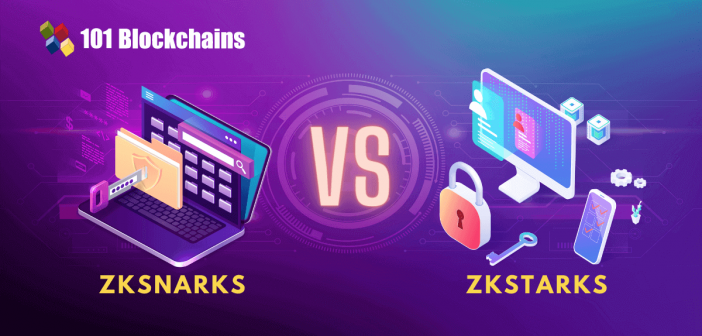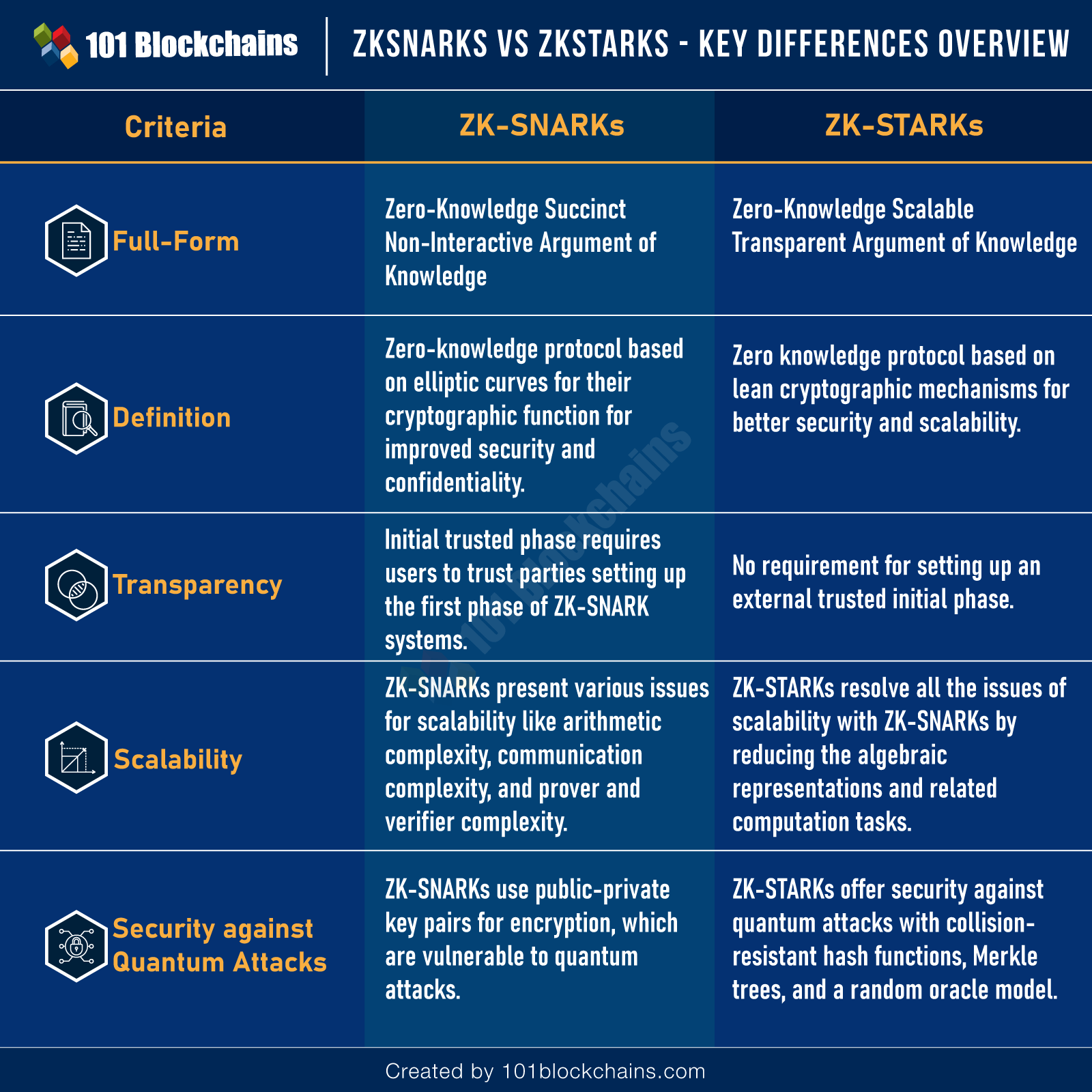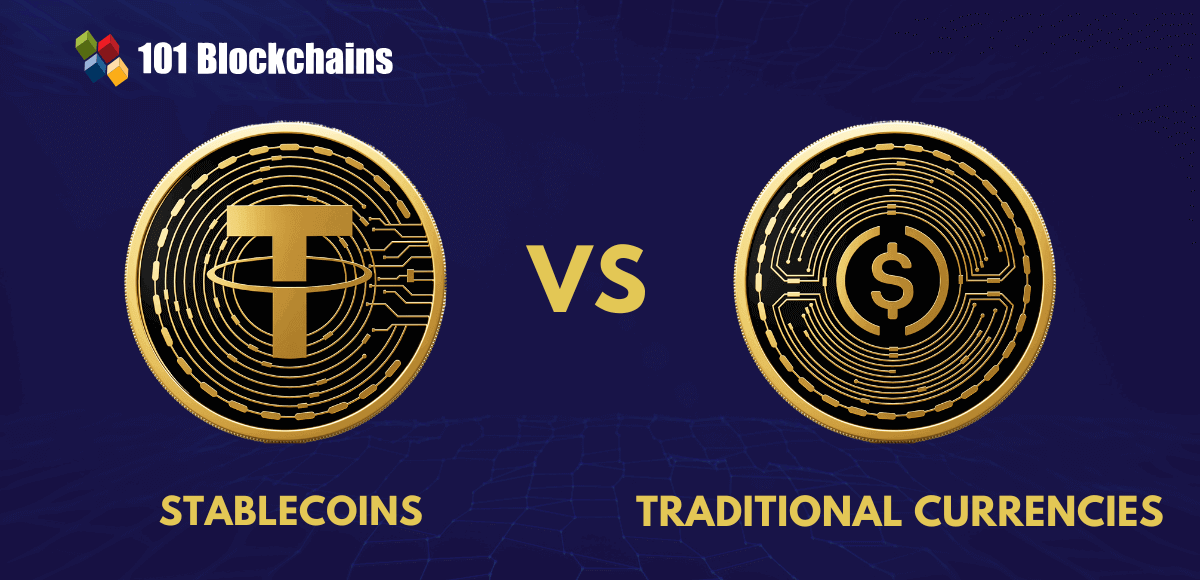Learn how blockchain truly works, master key definitions, and uncover what makes smart contracts so "smart." Dive into the fundamentals, gain valuable insights, and start your blockchain journey today!

- Comparisons
James Howell
- on March 11, 2022
Zksnarks vs zkstarks – Key Differences
Privacy and confidentiality are the two most prominent highlights of cryptocurrencies, focused largely on the financial market. Cryptocurrencies can support the execution of financial and value transactions on a blockchain network. On the other hand, the decentralized approach for financial exchanges without any trusted intermediary leads to security concerns for digital assets. Therefore, zero-knowledge protocols have evolved as a formidable solution to the confidentiality and privacy concerns in cryptocurrency platforms.
However, the choice of zero-knowledge technologies has turned out to be a troublesome decision for many professionals in the crypto world. With the growing hype around Zksnarks vs Zkstarks debate, anyone would obviously look for the better alternative among them. The following discussion offers you a detailed overview of ZK-SNARKs and ZK-STARKs alongside the notable points of difference between them.
Build your identity as a certified blockchain expert with 101 Blockchains’ Blockchain Certifications designed to provide enhanced career prospects.
Basics of Zero Knowledge Proof Technologies
Before diving into an outline of differences in a Zkstarks vs Zksnarks comparison, you must have a basic impression of the background for zero-knowledge technologies. The rise of cryptocurrencies has spelled an inevitable growth in the popularity of zero-knowledge-proof technologies.
It has served as a vital tool for use cases focused on privacy safeguards alongside verifiable computation. The fundamental pillars of Zero-Knowledge Proof (ZKP) technologies serve as the common highlights in the Zksnarks vs Zkstarks comparison. Here are the three important features you would find in a zero-knowledge proof.
-
Soundness
Soundness is the foremost aspect of ensuring confidentiality and privacy in the blockchain. It basically implies that the verifier can identify any discrepancy on behalf of the prover.
-
Completeness
Completeness implies that verifiers have assurance of true data from an honest prover in ZKP technologies.
-
Zero-Knowledge
The final and most important highlight of zero-knowledge protocols obviously refers to the zero-knowledge trait. It implies that in the event of a true statement, the verifier would not find out the details of the statement. On the contrary, the verifier would only know that the statement is true.
In simple terms, zero-knowledge proof technologies help one party prove that they know something to another party without revealing the information. For example, you don’t have to show your date of birth to prove that you are above 18 years of age. Quite fascinating, isn’t it? However, the Zkstarks vs Zksnarks debate has been gaining profound levels of attention in the crypto space recently.
Both of them are significant entries in the family or ZKP technologies, with unique privacy-enhancing functionalities. The two zero knowledge technologies help in reducing the amount of information shared among users alongside the advantages of a scaling technology. Zero-knowledge proof or ZKP technologies help in faster verification of proofs as they don’t hold the complete share of information on public systems. Where do they differ?
Excited to understand the core concepts of zero-knowledge proofs, Enroll Now in Zero Knowledge Proofs (ZKP) Masterclass
Differences between ZK-SNARK and ZK-STARK
The two most prominent zero-knowledge-proof technologies in the market right now are ZK-SNARK and ZK-STARK. ZK-STARK stands for Zero-Knowledge Scalable Transparent Argument of Knowledge. On the other hand, ZK-SNARK stands for Zero-Knowledge Succinct Non-interactive Argument of Knowledge. Both of them are the most appealing zero-knowledge technologies available in the crypto market right now.
Both of them are crucial aspects of the evolving base of zero-knowledge technologies. Subsequently, you should also note that the two zero-knowledge protocols are practically non-interactive, thereby implying the possibilities for autonomous actions and deployment of code. Let us find out more about the differences in a Zksnarks vs Zkstarks debate, starting with an overview of both technologies.
ZK-SNARKs
The earliest entry among zero-knowledge technologies, ZK-SNARKs evolved as a trustworthy option for elevating security in ZKP technologies. The primary design of these ZKP protocols revolved around the use of elliptic curves for improving security. Elliptic curves serve as a vital highlight in cryptography for the efficient discovery of the discrete logarithm of a random elliptic curve element. Without diving into the complex theories of cryptography, how can you find an ideal overview of the first player in a Zkstarks vs Zksnarks comparison? Let us decode the term ‘ZK-SNARKS’ itself to understand it.
The term ZK-SNARK represents zero-knowledge succinct non-interactive argument of knowledge, and you can separate each term for understanding ZK-SNARKS. By ‘succinct’ ZK-SNARKs imply the smaller size of proofs and quick verification. Older variants of ZKP protocols required interactions between the prover and verifier. However, the ‘non-interactive’ factor in ZK-SNARKs suggests limited to almost no interaction between the verifier and prover.
Now, the ‘arguments of knowledge’ part of the ZK-SNARKs acronym supports the integrity of the computational system. Dishonest prover would have limited chances of success without the actual arguments of knowledge for supporting their statements. As a result, the ZK-SNARK-based systems can ensure soundness alongside assumptions of the limited computing power of the prover.
Want to know how can ZKP deliver better security? Read: ZKP security
ZK-STARKs
The other prominent player in the Zksnarks vs Zkstarks debate, i.e., ZK-STARKs, is also one of the recent additions to the family of ZKP protocols. ZK-STARKs arrived in 2018 with a prominent focus on hash functions for their cryptographic foundations. ZK-STARK stands for the zero-knowledge scalable transparent argument of knowledge, and the term itself gives out a lot about its functionalities.
First of all, you can witness the ‘scalable’ aspect, which serves as an essential factor for overcoming the limits of transaction capacity. In addition, the ZK-STARKs do not need any initial trusted setup, thereby verifying the ‘transparency’ aspect clearly. Basically, ZK-STARKs offer a simpler structure when you look at the cryptographic aspects. Furthermore, the use of leaner cryptography mechanisms by employing collision-resistant hash functions could also provide the assurance of efficient security.
Get familiar with the terms related to cryptocurrency with cryptocurrency flashcards
Notable Points of Difference in ZK-STARKs vs ZK-SNARKs Debates

Please include attribution to 101blockchains.com with this graphic. <a href='https://101blockchains.com/blockchain-infographics/'> <img src='https://101blockchains.com/wp-content/uploads/2022/03/Zksnarks-vs-Zkstarks.png' alt='Zksnarks vs Zkstarks' /> </a>
The overview of both the zero-knowledge protocols presents them in a good light in their respective domains. However, it is important to identify the specific points of difference that set them apart. ZK-SNARKs presents some problems, which led to the development of ZK-STARKs. However, that does not mean ZK-SNARKs are obsolete in the existing crypto space. The prominent issues associated with ZK-SNARKs are responsible for preventing them from gaining popularity in the mainstream crypto landscape. Here is an outline of the notable differences you can find in a Zkstarks vs Zksnarks comparison.
-
Transparency
The prominent highlight in zero-knowledge scalable transparent argument of knowledge or ZK-STARK is transparency. As a matter of fact, transparency serves as a prominent highlight in the Zksnarks vs Zkstarks debate. In the case of ZK-SNARKs, you have to go through a mandatory trusted setup phase. For example, one of the notable cryptocurrencies using ZK-SNARKs, i.e., Zcash, requires users to set up a Genesis block alongside assuming its security.
While the initial setup phase may seem like a formality, it has many hidden consequences. For example, users have to place their trust in the initial setup phase alongside the parties involved in setting up the system. In such cases, ZK-SNARKs does not come out as the best of zero-knowledge protocols, considering the fact that the initial setup phase may have been compromised or would be in the future.
On the other side of the debate, ZK-STARKs does not require any external trusted setup phase. They offer randomness with scope for public verification, thereby preventing any party from obtaining the setup parameters. The public verifiability of proofs with anonymity also avoids the creation of any false proofs.
Want to become a Cryptocurrency expert? Enroll Now in Cryptocurrency Fundamentals Course
-
Scalability
The next point of comparison between the zero-knowledge succinct non-interactive argument of knowledge or ZK-SNARK and ZK-STARKs points to scalability. You have the opportunity to enjoy better scalability with ZK-STARKs in comparison to ZK-SNARKs. How? As a matter of fact, ZK-STARKs resolved many issues in ZK-SNARKs, which imposed restrictions on scalability.
First of all, ZK-STARKs reduced algebraic representations and the associated computation tasks in proof generation and verification. Optimization of the code for reducing arithmetic and computational complexity provides the ideal foundation for improved scalability.
The reduced arithmetic complexity of ZK-STARKs makes them a winner in a ZKsnarks vs ZKstarks debate. They are almost 8 to 10 times faster than ZK-SNARKs in terms of the computation size required for generating proofs. On top of it, ZK-STARKs use the FRI algorithm and new FFT algorithms as add-ons for speeding up verifier runtime.
ZK-SNARKs also present a formidable setback for scalability in terms of communication complexity. For example, the amount of messages needed among parties for solving a problem grows in a linear fashion for ZK-SNARKs. On the contrary, ZK-STARKs imply the growth of messages between parties at a slower rate.
However, ZK-SNARKs do not go down completely in terms of scalability in a Zkstarks vs Zksnarks comparison. ZK-SNARKs have the advantage of a smaller proof size which leaves ZK-STARKs with a scalability limitation.
-
Safety against Quantum Attacks
Another notable highlight in the comparison between the zero-knowledge scalable transparent argument of knowledge and ZK-SNARKs refers to resilience against quantum attacks. ZK-SNARKs depend on private-public encryption approaches such as ECDSA and RSA for creating private-public key pairs. The growth of quantum computing has led to the development of new algorithms, which can compromise such encryption approaches.
On the other hand, ZK-STARKs utilize collision-resistant hash functions and random oracle models. In addition, they also use Merkle trees to improve resilience against quantum attacks. The cryptographic primitives help in improving the resilience of ZK-STARKs towards quantum computation attacks.
Wondering about the role of Zero Knowledge Proofs in Blockchain? Read here How Zero Knowledge Proofs Are Changing Blockchain?
Final Words
The final take away from the Zkstarks vs ZKsnarks comparison obviously presents ZK-STARKs in a positive light. They offer better scalability, transparency, and security in comparison to ZK-SNARKs. However, it is also important to note that ZK-STARKs have a bigger proof size and require more time for verification.
On top of it, ZK-SNARKs also require 24% of the amount of gas required for transactions with ZK-STARKs. Therefore, you can notice how both zero-knowledge technologies have their unique value propositions. While ZK-SNARKs is well-established with a full-fledged community, documentation, and resources, ZK-STARKs is still in the initial stages. Learn more about both the popular zero knowledge technologies in detail now.
*Disclaimer: The article should not be taken as, and is not intended to provide any investment advice. Claims made in this article do not constitute investment advice and should not be taken as such. 101 Blockchains shall not be responsible for any loss sustained by any person who relies on this article. Do your own research!





